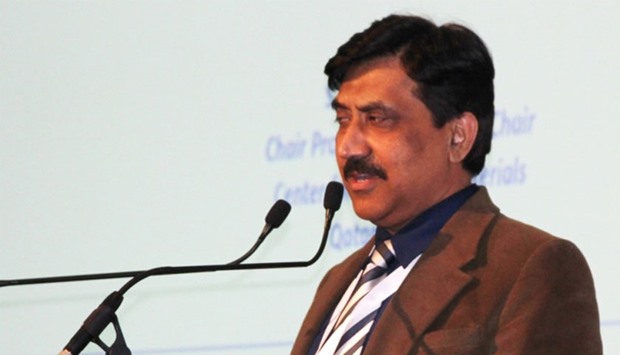"The captured CO2 is combined with hydrogen obtained from renewable sources to produce methanol," Centre for Advanced Materials chair Prof Syed Javaid Zaidi explained while presenting the carbon-neutral-cycle at a conference.
This methanol is then used as feed stock for petrochemical industries and as transportation fuel. The CO2 emitted from the combustion process is recycled back to produce methanol.
"In this way, no CO2 is emitted to the environment, the process is carbon-neutral and results in carbon-free environment.”
Zaidi, also the chair of Qatar Fuel Additives Company at QU, said the presence of more CO2 is an opportunity to transform it into green energy.
Besides contributing to a country’s economic growth, carbon-neutral-cycle will also help in protecting the environment with its zero toxic emission.
“Renewable methanol is fed to direct methanol fuel cells to generate power, which has wide range of applications,” he pointed out. “Fuel cells are at the verge of commercialisation and poised to become future source of clean energy.”
Zaidi also highlighted several technologies and processes that can be used to transform CO2 emissions to clean energy via fuel cells.
These include CO2 hydrogenation, dry reforming of CO2 with natural gas, electrochemical and photochemical reduction processes.
The chemical recycling of CO2 to produce carbon neutral renewable fuels and clean energy is considered as a feasible and powerful new approach that is at the stage of gradual development and implementation, according to Zaidi.
Citing Qatar’s efforts in trying to address CO2 emissions, the QU professor noted that the country will have to embark on different programmes that reduce emissions and develop solutions to transform CO2 into clean energy.
In Qatar, he said manufacturing and construction industries alone contribute to 32% of CO2 emissions while 35% comes from producing electricity and transport.
Zaidi sees the outlook for reducing CO2 as bright since Qatar and the GCC region has plenty of solar energy.
“Using advanced materials, clean energy technologies can be developed to reduce the impact on the environment,” he added.

